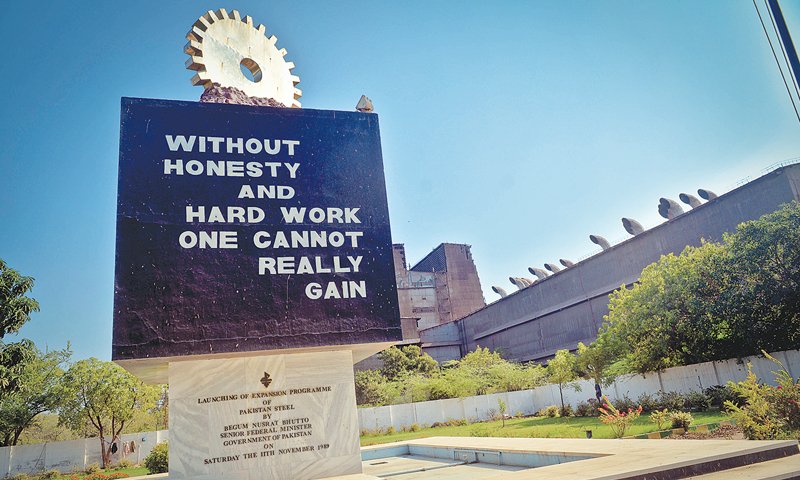“Build the nation strong” reads a signboard by the roadside as I follow the National Highway 40kms east of Karachi towards the country’s largest industrial complex: the Pakistan Steel Mills (PSM).
But the lofty sign belies the scene inside.
Chimneys that once used to belch out thick clouds of black smoke now gape airless. The screeching of the birds overhead are the only sound to be heard where once there used to be the din of layers upon layers of rust-coloured iron being converted into glistening hot metal.
And a despondent stillness has replaced the hustle and bustle of workers. My request to visit the production plant is politely declined by Shazim Akhtar, spokesman for the PSM.
The steel mills are now in a shambles. The situation is disappointing for the casual visitor, but it is shocking for those aware of the harsh facts.
Also read: Steel Mills at standstill
The reasons are easily understood. The production activity of the steel mills came to a standstill on Oct 8 after the movement of hot metal stopped because of a perforation in one of the two converters. This is despite the fact that the converter has been under maintenance since early this year.
This latest episode in the multi-billion-rupee state-owned behemoth has only added to the list of woes which brought its accumulated losses and liabilities to Rs258 billion over the past five years.
After reaping windfall for more than three decades, the mill’s workers are now bearing the consequences. “Have you told him that we have not received our salary for three months?” a disgruntled worker heckles a senior officer accompanying me. The worker flashes me a V-sign, perhaps meaning it as a taunt.
As I stop to speak to him, his smirking face turns grim. “Don’t they [the management] know that they [the blast furnace and converter] need regular maintenance?” he asks. “They know. But the problem lies with their intentions and the agenda they bring. No one or nothing can fix the steel mills but honesty.”
“Until a few months ago, we were producing only three per cent of the capacity,” admits the PSM spokesman.
The management, in private conversations, suggests even more funding by the government as the only source that can bring the stumbling industry out of the woods. The enterprise secured a government-funded bailout of Rs18.5 billion just a few months ago.
“It’s a myth, you know,” says a senior PSM official who does not want to be named. “The bailout package was introduced by the last PPP government but in fact all that was offered to Pakistan Steel is loans — high-interest and commercial loans which are not released in one go but in small tranches. It can never work.”
Like his bosses, he believes the PSM needs “immediate upgrade before it’s too late”. But the question as to what went wrong in 2008-2009, when the profit-making entity started suffering and bore operating losses worth Rs26.45bn, remains unanswered.
Spread over 18,600 acres, the steel mills were once a symbol of the country’s industrial strength.
With a production capacity of 1.1 million tonnes, it was envisaged in the 1960s and finally prime minister Zulfikar Ali Bhutto laid its foundation stone in 1973 to build with the assistance of the then USSR. Just outside the union office, I come upon two giant monuments.
One is the 1973 foundation stone laid by Mr Bhutto and the second is the one laid by his widow, Begum Nusrat Bhutto, in 1989 when she was the senior federal minister heading the launch of the PSM expansion programme.
In an ironic twist of fate, the PSM began to unravel on the watch of the last PPP government. Mismanagement, political interference and obviously corruption over the years cut every section down, says another official. With more than 15,000 employees, he adds, the situation has deteriorated so much that production has halted a couple of times this year for want of raw material.
“Issues with the mill in fact started much earlier, back in 2005,” says Shamshad Qureshi, chairman of the Pakistan Steel People’s Workers Union. “The then management should be questioned for neglecting the maintenance of the plant despite the fact that it was going through its best period, producing at its maximum capacity and minting higher profits than ever.”
Political economist Kaiser Bengali gives a comprehensive view on the dilemmas faced by the PSM. “The PSM is a case of political neglect for 30 years,” he says. “Every industry needs capital investment for modernisation which was never offered to the PSM.
Secondly, it never got a good and competent chief while frequent changes of government also hampered its performance.”
While the government is preparing to appoint financial advisers to make recommendations for the PSM’s survival, he believes privatisation cannot be an option considering the failure margin of that process. “Back in the 1990s, some 90 industries were privatised. But nearly two-thirds of them failed to sustain themselves,” he explains. “It needs capital investment to replace the ageing plant and equipment for cost-effective production.
A case of political neglect can only be resolved with political will.”
Published in Dawn, November 9th, 2014












































